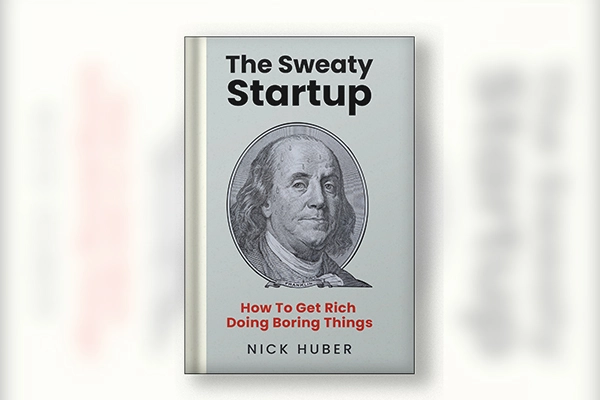The Sweaty Startup

We’ve all been sold a very specific dream. It’s plastered across TechCrunch, Product Hunt, and Shark Tank. It’s preached by business titans like Elon Musk and Mark Zuckerberg. The path to wealth, we’re told, is paved with world-changing ideas. It’s about “0 to 1,” finding a “blue ocean,” raising venture capital, and creating the next viral app.
You know what? It’s all garbage. According to Nick Huber, author of The Sweaty Startup, the glorified story of the revolutionary idea is not just rare; it’s one of the worst paths an aspiring entrepreneur can take. The most common path to wealth isn’t glamorous. It’s about chasing small, boring opportunities in businesses like lawn care, bookkeeping, and home services.
1. Your “Revolutionary Idea” is Sabotaging You. The Real Money is in Boring Stuff.
The media narrative that celebrates radical innovation has set up a generation of entrepreneurs for failure. The hard truth is that chasing a unique, disruptive idea is one of the worst ways to maximize your odds of success. As Huber points out, “Ninety-nine out of a hundred ‘new idea’ startups fail.”
He saw this firsthand in his college entrepreneurship course. His 24 classmates pitched grand, new ideas that required pitch decks and millions in funding. Every single one of them failed to make a single dollar and ended up getting jobs. Meanwhile, Huber’s idea was a “boring, old-fashioned” student storage service called Storage Squad. His plan wasn’t based on a stroke of genius; it was a calculated move. He had observed an existing competitor making an estimated $200,000 per year in profit while being wildly inefficient—they used clipboards and their website was terrible.
His classmates and professor were unimpressed, telling him it wasn’t scalable and would never be big. His own father worriedly told him, “You’re using your Ivy League degree to drive a moving truck.” Yet, Storage Squad was profitable from day one. It’s not about being a visionary; it’s about being a practical opportunist.
Entrepreneurship isn’t about trying to change the world with the next scalable idea. It is about starting small, looking for a way to make good money doing something simple, and copying proven strategies that work.
2. That High-Status Career is a Trap. The Real Prize is Freedom.
Success is often defined by status and income, but this is a dangerous illusion. The book tells the story of the author’s friend who seemed to have won the game of life. He was the valedictorian, a graduate of Columbia and Harvard Law, and was earning over $1 million a year at one of the world’s most prestigious law firms.
But he had zero freedom. He couldn’t work remotely. He had to get permission six months in advance for any vacation, and it could be canceled at a moment’s notice. The breaking point came when his boss told him to “suck it up” and miss the birth of his first child for a high-profile case. He realized his boss was the “perfect embodiment of who he did not want to become.” The man was fifty years old, divorced, overweight, unhealthy, had no relationship with his children, and lived on seventy-hour workweeks. His friend quit on the spot.
The real prize isn’t status; it’s leverage. True leverage isn’t just control over your time; it’s owning assets and building systems that make you money while you sleep. While the lawyer stopped getting paid the moment he stopped working, an entrepreneur with a boring business has “nearly infinite” time leverage because their company runs without them. True wealth is the freedom to do what you want, when you want.
A lot of careers are like hot-dog-eating contests. If you get really good at eating hot dogs, you get rewarded with more hot dogs. Too many people are socially conditioned and pressured by those around them to play games where winning the game doesn’t lead to a good life.
3. Forget ‘Follow Your Passion.’ Your Passion Project is Probably a Terrible Business.
The advice to “follow your passion” is one of the most destructive clichés in business. The hard reality is that the market does not care about what you find fun, exciting, or fulfilling.
Huber points to industries like restaurants and fitness apps. These are “fun” categories that attract “a whole bunch of dreamers.” The result? Intense competition, people willing to lose money for their passion, and razor-thin profit margins.
Contrast that with “sweaty startups” in low-status, boring industries like HVAC, self-storage, or lawn care. Here, the opportunity lies in competing against people who are decades behind. The competition is often less sophisticated—some still use fax machines and clipboards—and there is far more profit to go around. This is a critical insight for any entrepreneur: make decisions with your brain, not your heart. Look for market opportunities and weak competition, not just a way to monetize your hobby.
The market doesn’t care about you or your desires. It doesn’t care about what you love doing or what you are good at. It doesn’t care about your interests or what excites you. It could care less about what you are passionate about.
4. You’ve Been Told to Be an Entrepreneur. You Probably Shouldn’t.
In a genre filled with rah-rah motivational advice, The Sweaty Startup delivers a stern warning rarely heard in business books: entrepreneurship is not for everyone. In fact, it’s not for most people.
Huber’s warning comes from a place of genuine fear that he might “talk too many people into going down this road” only for them to “end up forty years old, divorced, and unhealthy with a failed business.” He argues that business ownership is “brutal and stressful” and demands a unique skill set that most people simply don’t have. He doesn’t pull any punches in his assessment:
“They are terrible decision makers. They are overweight. They can’t handle a $500 surprise expense without borrowing money. The average person can’t manage their own life, let alone an organization.”
This blunt honesty leads to the book’s most counter-intuitive piece of advice. Instead of pushing everyone to chase the entrepreneurial dream, Huber presents a far more realistic path to a good life for the majority of people.
For most people, the best quality of life can be achieved by going to work for a good boss at a good company and earning good money with as little stress as possible.
Conclusion: What Game Are You Playing?
The celebrated path to wealth—the billion-dollar idea, the venture capital, the world-changing disruption—is largely a myth that sets people up for failure. A more realistic and achievable path lies in pursuing boring, simple businesses with discipline, focusing on proven models, and out-executing weak competition. It’s about redefining success not as status, but as freedom.
The real path to wealth is about giving yourself permission—permission to be boring, to ignore the hype, and to play a game you can actually win. It forces you to ask the most important question of all.
Take a hard look at the career you’re building. What game are you playing, and is the prize truly worth winning?
Nick Huber is a serial entrepreneur, investor, and content creator with a focus on real estate and entrepreneurship. He is the founder of The Sweaty Startup movement, where he shares his personal philosophy on business and life while building a diverse portfolio of companies in real-time. His main business is Bolt Storage, a real estate private equity firm that he co-founded and operates, which owns 1.9 million square feet of self-storage facilities across 62 locations. Additionally, he holds stakes in 10 other businesses that collectively employ over 250 people. Nick lives in Athens, Georgia with his wife and three kids.
Book details
- Title: The Sweaty Startup
- Explanatory Title: How to Get Rich Doing Boring Things
- Author: Nick Huber
- Publisher: Harper Business
- Publication Date: April 29, 2025
- Print Length: 240 pages
- ISBN-10: 006338762X
- ISBN-13: 978-0063387621
- Category: Small Business / Entrepreneurship / Venture Capital

